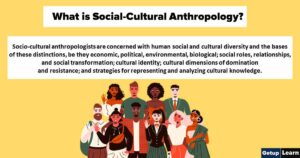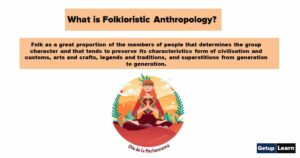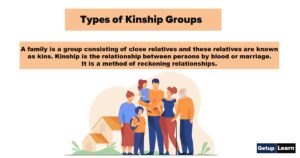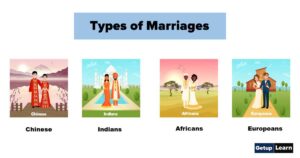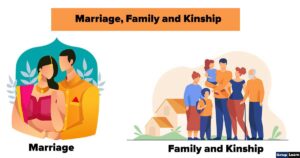Table of Contents
What is Family?
In simple words, a family is a domestic group in which parents and children live together, and in its elementary form consists of a couple and their children.
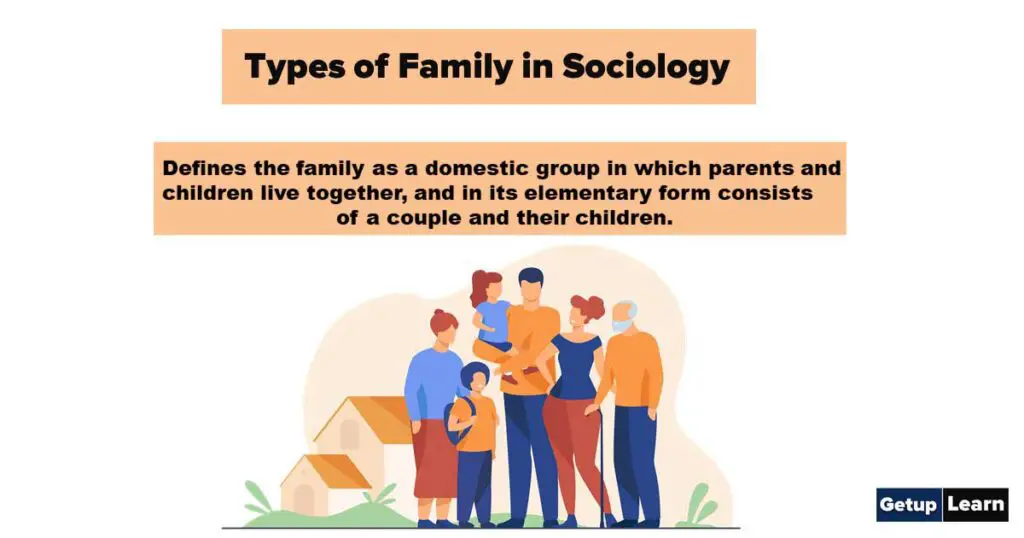
A family is a group of people related or connected by bloodline and marriage rite or adoption. They share common residencies. They live together. They share sentiments of oneness. They view themselves as a unit. They share values and responsibilities. Perform caretaking services for others especially the very young.
Table of Contents
Types of Family in Sociology
Sociologists and anthropologists have identified various forms and kinds of families with regards to the cultural peculiarities as obtainable in various societies over time. However, according to Ingiabuna and Obaro (2009) families are categorized based on the number and generations of people involved in the family groups and the leadership or power/authority holders in the group:
These are the types of family in sociology:
- Nuclear Family
- Extended Family
- Blended Families
- Compound Family
- Patriarchal Family
- Matriarchal Family
- Egalitarian Family
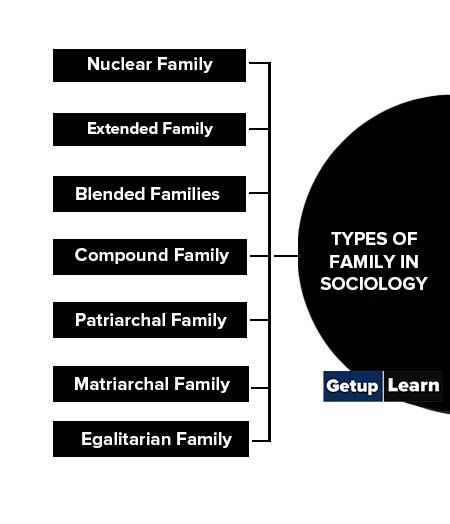
Nuclear Family
The nuclear family refers to a couple along with any dependent, unmarried children who share a residence and form a social unit. In simple words, it is made up of a husband, wife and dependent children living together in a single dwelling. The nuclear family is the smallest unit of society and it is also called the elementary family.
The typical household units in many modern societies are the nuclear family. Sociologists and anthropologists have distinguished the nuclear family into two broad categories i.e. the family of orientation or natal family – the family in which one is born and grows up, and the family of procreation or conjugal family – the family formed when one marries and has children.
Extended Family
Units larger than the nuclear family are usually known as the extended families; they are extended nuclear units. An extended family according to Knuttila is when three or more generations connected by blood or marriage relationships form a social unit and live together.
The extension of nuclear units can either be vertical or horizontal. It is vertical if, for example, the addition is from members of a third-generation such as the spouses‟ parents and horizontal if for instance, the addition of members of the same generation as the spouses, such as the husband‟s brother or an additional wife etc.
Hence an extended family is a constituent of several related persons by descent, marriage or adoption such as a husband and a wife and their children and at least one of their sets of parents, aunts, uncles, nieces and nephews all living together in a single dwelling or in close proximity.
Blended Families
This is a family made up of a couple and children either or both raised in an earlier marriage, and children they raised together (if any). Most people who divorce eventually get remarried. A good number of such persons often times divorce leaving behind children.
Remarriage frequently results in stepfamilies, also called reconstituted‟, reorganizing‟ or „blended‟ families. Because a good number of those who remarry are parents, their new partners become stepparents. This form of the nuclear family has become very common in modern times.
Compound Family
This form of family organization can be seen as an overlapping set of nuclear families, each with the same man as the family head. It consists of a man (head of households); his wives and concubines who live in different homesteads with their children. In this case, the wives become head of their own respective household while the man rules and runs all households.
This kind of family is mostly popular amongst traditional West African societies.
Types of Family According to Authority and Power Structure
Authority and decision-making in the family vary from society to society and as earlier mentioned authority structure is one of the parameters to categorize families. The following kinds of families have been identified based on authority and power structure:
Patriarchal Family
Patriarchal Family: In this kind of family structure, decision-making authority and power lies in the hands of the man whether be it a nuclear family, single-family or extended family. Male-headed households are obtainable in most societies; and in absence of the man, the eldest son becomes the leader of the household.
Matriarchal Family
Matriarchal Family: This is a female-headed family. The matriarchal family is sometimes called the „matrifocal‟ family (Haralambos and Holborns 2008). Here authority is vested on the woman, resulting especially where the man or husband of a woman has died, or when the men desert their wives. Female-headed households are very common in the West Indies and Nayar in India.
Egalitarian Family
Egalitarian Family: Egalitarian family describes an arrangement in the family where power and decision-making authority are equally distributed between the husband and wife. Due to Western education, skills paid employment for women, women emancipation programmes in recent times, women now share equal authority with men in the family as they jointly contribute to the family welfare etc.
Functions of Family
The family as stated earlier is the smallest and most basic social unit of society and in whatever form it expresses itself, it is found in every society. This implies that the family as the basic social institution is playing a vital role central to the survival of any society and some of these functions of family are considered here:
- Nurture
- Regulation of Sexual Relationships
- Procreation
- Social Placement
- Material and Emotional Security
- Affection and Companionship
- Protection
- Socialization
- Legitimizing Inheritance
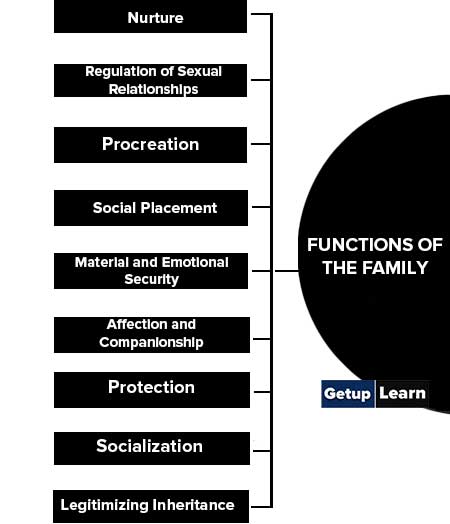
Nurture
Nurture: Every child is born into a family and every child is expected to be fed, clothed, educated and cared for. This responsibility lies in the hands of the family; hence the family ensures providing for the welfare needs of the children thereby ensuring the survival of the next generation of society.
Regulation of Sexual Relationships
Regulation of Sexual Relationships: One of the paramount biological needs of men in all society is sexual relationships. Such relationship is often protected with rules and regulations in all societies and it is the family that helps and enforce such rules.
This is done to prevent incestuous relationships for example the need for one not to have a sexual relationship with a close relative or kin etc. The family also screens and approves sexual partners and spouses for members.
Procreation
Procreation: The family through the regulation of sexual relationship function fulfils the biological need of reproduction and perpetuation of both the immediate family and the society as a whole.
Social placement: As earlier mentioned, the family is the basic unit of identity for every individual. An individual acquires his identity and place in society through his family. The family ascribes many statuses to its members such as; race, ethnic affiliation, nationality, religion, royalty etc.
Material and Emotional Security
Material and Emotional Security: It is the function of the family to ensure that the material and psychological needs of its members are satisfied by providing necessary economic, social and psychological support.
Affection and Companionship
Affection and Companionship: The family is expected to provide affection and companionship for its members. Children are given warm affection within the family to develop a positive self-image, and adults in the family need intimate companionship to cope with life. This breeds a sense of belonging.
Protection
Protection: The family in almost all societies of the world offers some degree of physical, social, economic and psychological protection to its members. Nevertheless, the government through its apparatus like the police, social welfare department now shares this function with the family.
Socialization: Every society has its norms, values, customs and approved behavioural codes of conduct which is passed on from generation to generation. The family performs the function of socialization, teaching the young ones the values and norms of society. Indeed the earliest and continuous form of education and socialization takes place within the family.
Legitimizing Inheritance
Legitimizing Inheritance: The family often confers inheritance rights on the members. It does this by identifying relationships through kinship. In most Nigerian communities, except one is able to trace a relationship to a family, he or she could be denied land rights.
FAQs About Types of Family in Sociology
What are the types of family in sociology:
The following are the types of family in sociology:
1. Nuclear Family
2. Extended Family
3. Blended Families
4. Compound Family
5. Patriarchal Family
6. Matriarchal Family
7. Egalitarian Family.
What are the functions of a family?
The following are the functions of a family:
1. Nurture
2. Regulation of Sexual Relationships
3. Procreation
4. Social Placement
5. Material and Emotional Security
6. Affection and Companionship
7. Protection
8. Socialization
9. Legitimizing Inheritance.
YOU MIGHT ALSO LIKE
- What is Anthropology?
- Branches of Anthropology
- What is Social Anthropology?
- Scope of Social Anthropology
- Nature of Social Anthropology
- What is Social Cultural Anthropology?
- Theories of Sociocultural Anthropology
- What are Archaeological Sites?
- Types of Archaeological Sites
- What is Linguistic Anthropology?
- What is Marriage?
- Types of Marriage
- What is Family?
- Types of Family in Sociology
- Functions of the Family
- Folk literature
- What is Biological Anthropology?
- Biological Anthropology Fields of Study
- What is Social Anthropology?
- Definition of Social Anthropology
- Scope of Social Anthropology
- Nature of Social Anthropology
- What is archaeology?
- What is Archaeological Anthropology?
- Process of Archaeology
- Types of Archaeology Sites
- Linguistics Language
- Linguistic Culture
- Types of Marriages
- What is Kinship?
- Types of Kinship Groups
- What is Folkloristic Anthropology?
What are the 5 different types of families?
These are some basic types of families nuclear family, extended family, blended family, compound family, patriarchal family. The nuclear family refers to a couple along with any dependent, unmarried children who share a residence and form a social unit.
How many types of family are three?
There are 7 types of families Nuclear Family
Extended Family
Blended Families
Compound Family
Patriarchal Family
Matriarchal Family
Egalitarian Family.

